Deck 14: Functions of Several Variables and Partial Differentiation
سؤال
سؤال
سؤال
سؤال
سؤال
سؤال
سؤال
سؤال
سؤال
سؤال
سؤال
سؤال
سؤال
سؤال
سؤال
سؤال
سؤال
سؤال
سؤال
سؤال
سؤال
سؤال
سؤال
سؤال
سؤال
سؤال
سؤال
سؤال
سؤال
سؤال
سؤال
سؤال
سؤال
سؤال
سؤال
سؤال
سؤال
سؤال
سؤال
سؤال
سؤال
سؤال
سؤال
سؤال
سؤال
سؤال
سؤال
سؤال
سؤال
سؤال
سؤال
سؤال
سؤال
سؤال
سؤال
سؤال
سؤال
سؤال
سؤال
سؤال
سؤال
سؤال
سؤال
سؤال
سؤال
سؤال
سؤال
سؤال
سؤال
سؤال
سؤال
سؤال
سؤال
سؤال
سؤال
سؤال
سؤال
سؤال
سؤال
سؤال

فتح الحزمة
قم بالتسجيل لفتح البطاقات في هذه المجموعة!
Unlock Deck
Unlock Deck
1/112
العب
ملء الشاشة (f)
Deck 14: Functions of Several Variables and Partial Differentiation
1
Compute the indicated function value. 
A) -53
B) -29
C) -45
D) -98

A) -53
B) -29
C) -45
D) -98
-53
2
Describe the range of the function. 
A)
B)
C)
D)

A)

B)

C)

D)


3
Which of the following is the contour plot of  ?
? 
A)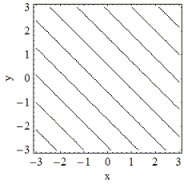
B)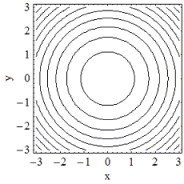
C)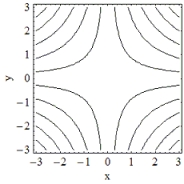
D)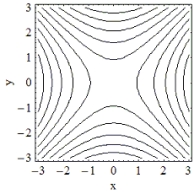
 ?
? 
A)

B)

C)

D)


4
Sketch the indicated traces of  .
. 
 .
. 

فتح الحزمة
افتح القفل للوصول البطاقات البالغ عددها 112 في هذه المجموعة.
فتح الحزمة
k this deck
5
Describe and sketch the domain of the function. 
A)
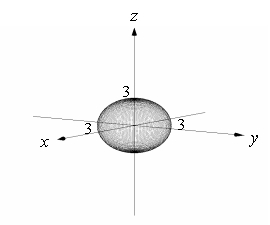
B)
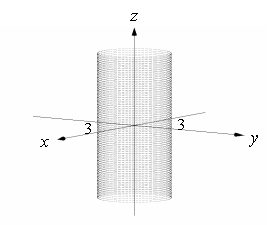
C)
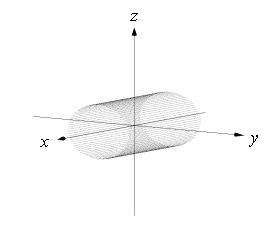
D)

A)


B)


C)


D)


فتح الحزمة
افتح القفل للوصول البطاقات البالغ عددها 112 في هذه المجموعة.
فتح الحزمة
k this deck
6
Wind chill is a combination of temperature and wind speed that expresses how cold the air feels. The larger the wind speed, the more rapidly heat is lost to the air and thus the colder it feels. The table shows the wind chill for selected temperatures and wind speeds. For the function  , find
, find  . Temperature (degrees Fahrenheit)
. Temperature (degrees Fahrenheit)
Wind speed
(mph)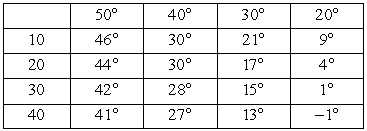
A)
B)
C)
D)
 , find
, find  . Temperature (degrees Fahrenheit)
. Temperature (degrees Fahrenheit)Wind speed
(mph)

A)

B)

C)

D)


فتح الحزمة
افتح القفل للوصول البطاقات البالغ عددها 112 في هذه المجموعة.
فتح الحزمة
k this deck
7
Describe and sketch the domain of the function. 
A)
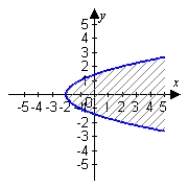
B)
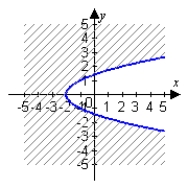
C)
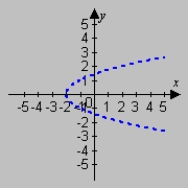
D)
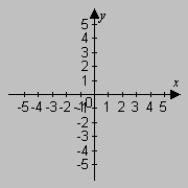

A)


B)


C)


D)



فتح الحزمة
افتح القفل للوصول البطاقات البالغ عددها 112 في هذه المجموعة.
فتح الحزمة
k this deck
8
Which of the following is the contour plot of  ?
? 
A)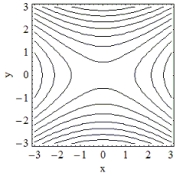
B)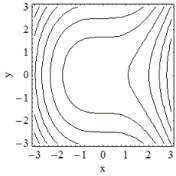
C)
D)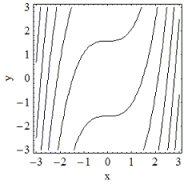
 ?
? 
A)

B)

C)

D)


فتح الحزمة
افتح القفل للوصول البطاقات البالغ عددها 112 في هذه المجموعة.
فتح الحزمة
k this deck
9
Use a graphing utility to sketch the graph of  . Use the viewpoint
. Use the viewpoint  and
and  (see figure).
(see figure). 
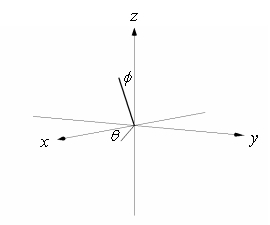
A)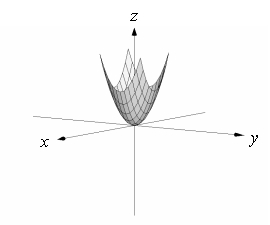
B)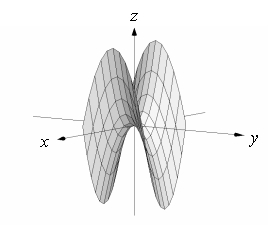
C)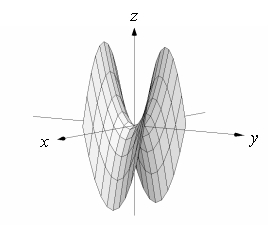
D)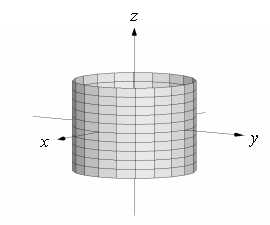
 . Use the viewpoint
. Use the viewpoint  and
and  (see figure).
(see figure). 

A)

B)

C)

D)


فتح الحزمة
افتح القفل للوصول البطاقات البالغ عددها 112 في هذه المجموعة.
فتح الحزمة
k this deck
10
Which of the following is the contour plot of  ?
? 
A)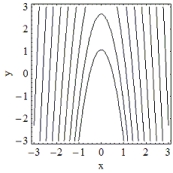
B)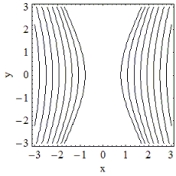
C)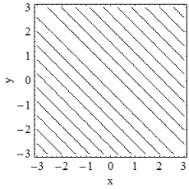
D)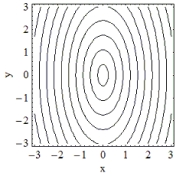
 ?
? 
A)

B)

C)

D)


فتح الحزمة
افتح القفل للوصول البطاقات البالغ عددها 112 في هذه المجموعة.
فتح الحزمة
k this deck
11
Describe and sketch the domain of the function. 
A)
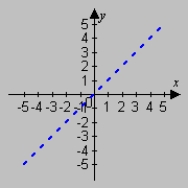
B)
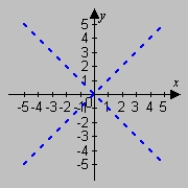
C)
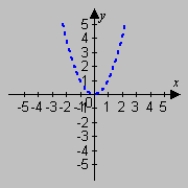
D)
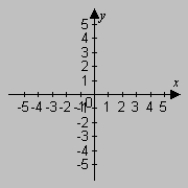

A)


B)


C)


D)



فتح الحزمة
افتح القفل للوصول البطاقات البالغ عددها 112 في هذه المجموعة.
فتح الحزمة
k this deck
12
Sketch the indicated traces of  .
. 
 .
. 

فتح الحزمة
افتح القفل للوصول البطاقات البالغ عددها 112 في هذه المجموعة.
فتح الحزمة
k this deck
13
Compute the indicated function value. 
A)
B)
C) -2
D) undefined

A)

B)

C) -2
D) undefined

فتح الحزمة
افتح القفل للوصول البطاقات البالغ عددها 112 في هذه المجموعة.
فتح الحزمة
k this deck
14
Use a graphing utility to sketch the graph of  . Use the viewpoint
. Use the viewpoint  and
and  (see figure).
(see figure). 
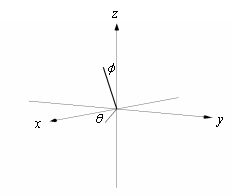
A)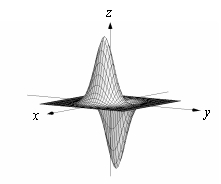
B)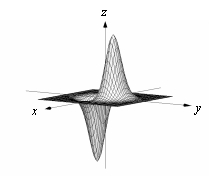
C)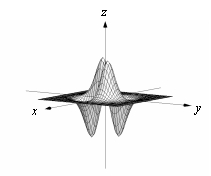
D)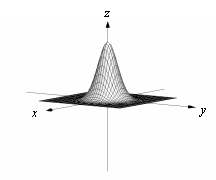
 . Use the viewpoint
. Use the viewpoint  and
and  (see figure).
(see figure). 

A)

B)

C)

D)


فتح الحزمة
افتح القفل للوصول البطاقات البالغ عددها 112 في هذه المجموعة.
فتح الحزمة
k this deck
15
Which of the following is the contour plot of  ?
? 
A)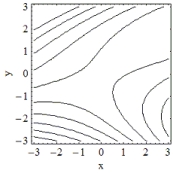
B)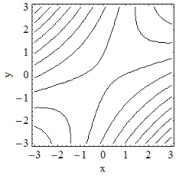
C)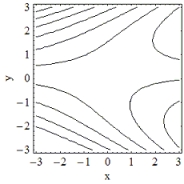
D)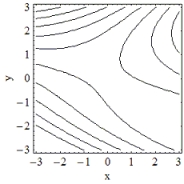
 ?
? 
A)

B)

C)

D)


فتح الحزمة
افتح القفل للوصول البطاقات البالغ عددها 112 في هذه المجموعة.
فتح الحزمة
k this deck
16
Describe the range of the function. 
A)
B)
C)
D)

A)

B)

C)

D)


فتح الحزمة
افتح القفل للوصول البطاقات البالغ عددها 112 في هذه المجموعة.
فتح الحزمة
k this deck
17
Describe the range of the function. 
A)
B)
C)
D)

A)

B)

C)

D)


فتح الحزمة
افتح القفل للوصول البطاقات البالغ عددها 112 في هذه المجموعة.
فتح الحزمة
k this deck
18
Use a graphing utility to sketch the graph of  . Use the viewpoint
. Use the viewpoint  and
and  (see figure).
(see figure). 
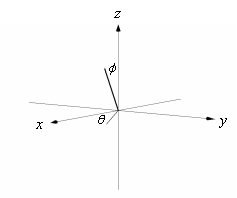
A)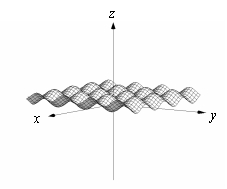
B)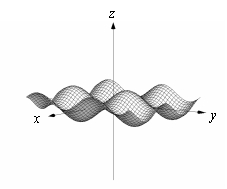
C)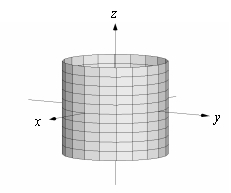
D)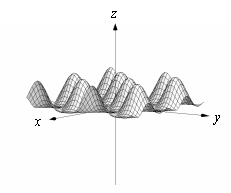
 . Use the viewpoint
. Use the viewpoint  and
and  (see figure).
(see figure). 

A)

B)

C)

D)


فتح الحزمة
افتح القفل للوصول البطاقات البالغ عددها 112 في هذه المجموعة.
فتح الحزمة
k this deck
19
Wind chill is a combination of temperature and wind speed that expresses how cold the air feels. The larger the wind speed, the more rapidly heat is lost to the air and thus the colder it feels. The table shows the wind chill for selected temperatures and wind speeds. At  and a wind speed of 30 mph, how much change in wind chill can be expected if the wind speed increases by 10 mph? Temperature (degrees Fahrenheit)
and a wind speed of 30 mph, how much change in wind chill can be expected if the wind speed increases by 10 mph? Temperature (degrees Fahrenheit)
Wind speed
(mph)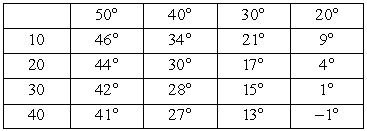
A)
B)
C)
D)
 and a wind speed of 30 mph, how much change in wind chill can be expected if the wind speed increases by 10 mph? Temperature (degrees Fahrenheit)
and a wind speed of 30 mph, how much change in wind chill can be expected if the wind speed increases by 10 mph? Temperature (degrees Fahrenheit)Wind speed
(mph)

A)

B)

C)

D)


فتح الحزمة
افتح القفل للوصول البطاقات البالغ عددها 112 في هذه المجموعة.
فتح الحزمة
k this deck
20
Describe and sketch the domain of the function. 
A)
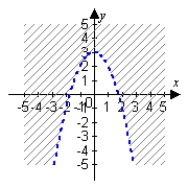
B)
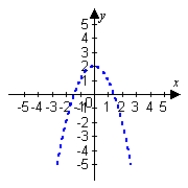
C)
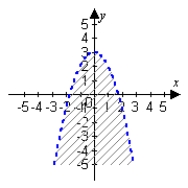
D)
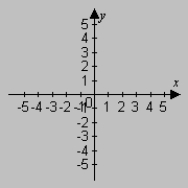

A)


B)


C)


D)



فتح الحزمة
افتح القفل للوصول البطاقات البالغ عددها 112 في هذه المجموعة.
فتح الحزمة
k this deck
21
Show that the limit does not exist. 


فتح الحزمة
افتح القفل للوصول البطاقات البالغ عددها 112 في هذه المجموعة.
فتح الحزمة
k this deck
22
Use polar coordinates to find the indicated limit, if it exists. Note that  is equivalent to
is equivalent to  .
. 
A) 0
B) 1
C) -1
D) The limit is undefined.
 is equivalent to
is equivalent to  .
. 
A) 0
B) 1
C) -1
D) The limit is undefined.

فتح الحزمة
افتح القفل للوصول البطاقات البالغ عددها 112 في هذه المجموعة.
فتح الحزمة
k this deck
23
Match the surface to its density plot. 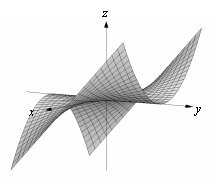
A)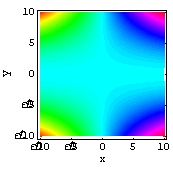
B)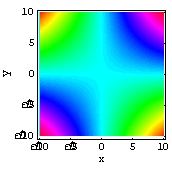
C)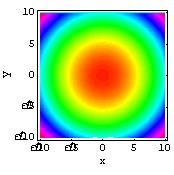
D)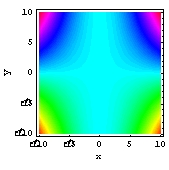

A)

B)

C)

D)


فتح الحزمة
افتح القفل للوصول البطاقات البالغ عددها 112 في هذه المجموعة.
فتح الحزمة
k this deck
24
Determine all points at which the given function is continuous. 
A)
B)
C)
D)

A)

B)

C)

D)


فتح الحزمة
افتح القفل للوصول البطاقات البالغ عددها 112 في هذه المجموعة.
فتح الحزمة
k this deck
25
Show that the limit does not exist. 


فتح الحزمة
افتح القفل للوصول البطاقات البالغ عددها 112 في هذه المجموعة.
فتح الحزمة
k this deck
26
Show that the limit does not exist. 


فتح الحزمة
افتح القفل للوصول البطاقات البالغ عددها 112 في هذه المجموعة.
فتح الحزمة
k this deck
27
Show that the indicated limit exists. 


فتح الحزمة
افتح القفل للوصول البطاقات البالغ عددها 112 في هذه المجموعة.
فتح الحزمة
k this deck
28
Show that the indicated limit exists. 


فتح الحزمة
افتح القفل للوصول البطاقات البالغ عددها 112 في هذه المجموعة.
فتح الحزمة
k this deck
29
Ammonia (NH3) is a gas used for manufacturing fertilizers as well as urethane foams and coatings. A particular gas cylinder contains 17.03 grams of ammonia. The pressure P (in atmospheres (atm)), volume V (in liters (L)), and temperature T (in Kelvin (K)) of the sample are related by the equation  . For the function
. For the function  , compute
, compute  .
.
A) 0.0 atm
B) 44.2 atm
C) 14.3 atm
D) 15.5 atm
 . For the function
. For the function  , compute
, compute  .
.A) 0.0 atm
B) 44.2 atm
C) 14.3 atm
D) 15.5 atm

فتح الحزمة
افتح القفل للوصول البطاقات البالغ عددها 112 في هذه المجموعة.
فتح الحزمة
k this deck
30
Compute the indicated limit. 
A)
B)
C) 1
D) undefined

A)

B)

C) 1
D) undefined

فتح الحزمة
افتح القفل للوصول البطاقات البالغ عددها 112 في هذه المجموعة.
فتح الحزمة
k this deck
31
Match the surface to its contour plot. 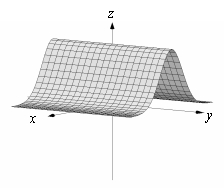
A)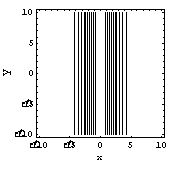
B)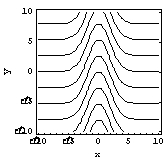
C)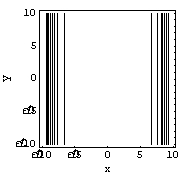
D)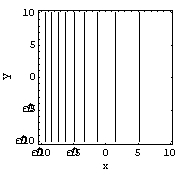

A)

B)

C)

D)


فتح الحزمة
افتح القفل للوصول البطاقات البالغ عددها 112 في هذه المجموعة.
فتح الحزمة
k this deck
32
Use polar coordinates to find the indicated limit, if it exists. Note that  is equivalent to
is equivalent to  .
. 
A) 0
B) 1
C) -1
D) The limit is undefined.
 is equivalent to
is equivalent to  .
. 
A) 0
B) 1
C) -1
D) The limit is undefined.

فتح الحزمة
افتح القفل للوصول البطاقات البالغ عددها 112 في هذه المجموعة.
فتح الحزمة
k this deck
33
Determine all points at which the given function is continuous. 
A)
B)
C)
D)

A)

B)

C)

D)


فتح الحزمة
افتح القفل للوصول البطاقات البالغ عددها 112 في هذه المجموعة.
فتح الحزمة
k this deck
34
Determine all points at which the given function is continuous. 
A)
B)
C)
D)

A)

B)

C)

D)


فتح الحزمة
افتح القفل للوصول البطاقات البالغ عددها 112 في هذه المجموعة.
فتح الحزمة
k this deck
35
Compute the indicated limit. 
A) undefined
B)
C) 0
D)

A) undefined
B)

C) 0
D)


فتح الحزمة
افتح القفل للوصول البطاقات البالغ عددها 112 في هذه المجموعة.
فتح الحزمة
k this deck
36
Match the surface to its density plot. 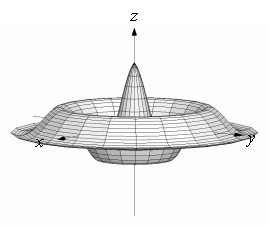
A)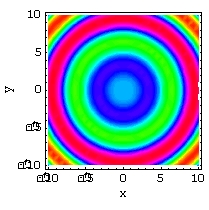
B)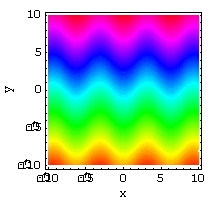
C)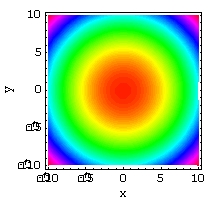
D)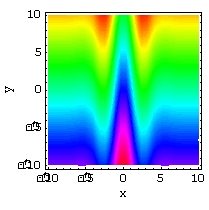

A)

B)

C)

D)


فتح الحزمة
افتح القفل للوصول البطاقات البالغ عددها 112 في هذه المجموعة.
فتح الحزمة
k this deck
37
Match the surface to its contour plot. 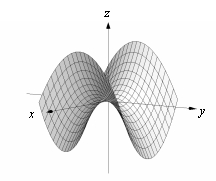
A)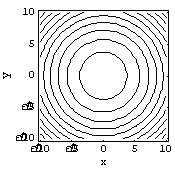
B)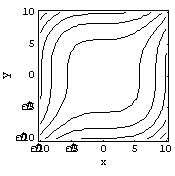
C)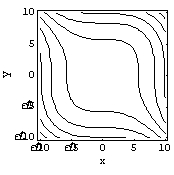
D)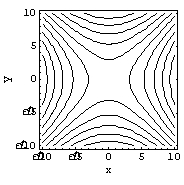

A)

B)

C)

D)


فتح الحزمة
افتح القفل للوصول البطاقات البالغ عددها 112 في هذه المجموعة.
فتح الحزمة
k this deck
38
Show that the indicated limit exists. 


فتح الحزمة
افتح القفل للوصول البطاقات البالغ عددها 112 في هذه المجموعة.
فتح الحزمة
k this deck
39
Match the surface to its contour plot. 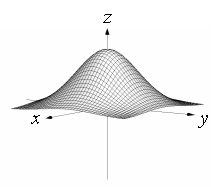
A)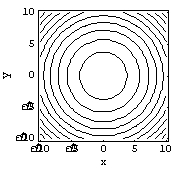
B)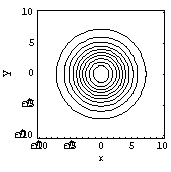
C)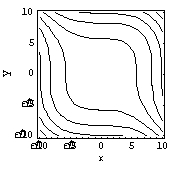
D)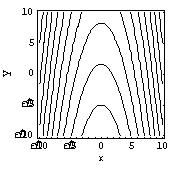

A)

B)

C)

D)


فتح الحزمة
افتح القفل للوصول البطاقات البالغ عددها 112 في هذه المجموعة.
فتح الحزمة
k this deck
40
Match the surface to its density plot. 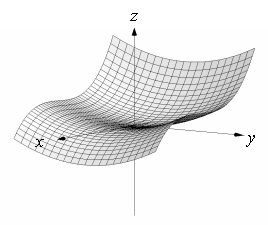
A)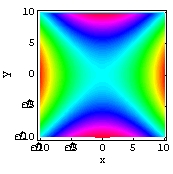
B)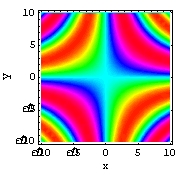
C)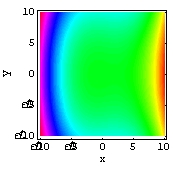
D)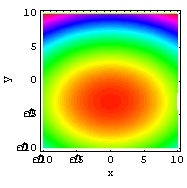

A)

B)

C)

D)


فتح الحزمة
افتح القفل للوصول البطاقات البالغ عددها 112 في هذه المجموعة.
فتح الحزمة
k this deck
41
Find the indicated partial derivative. 
A)
B)
C)
D)

A)

B)

C)

D)


فتح الحزمة
افتح القفل للوصول البطاقات البالغ عددها 112 في هذه المجموعة.
فتح الحزمة
k this deck
42
Find a function with the given properties. 
A)
B)
C)
D)

A)

B)

C)

D)


فتح الحزمة
افتح القفل للوصول البطاقات البالغ عددها 112 في هذه المجموعة.
فتح الحزمة
k this deck
43
The pressure P of a gas in a leak-tight container can be approximated by  , where V is the volume of the container, T is its absolute (Kelvin) temperature, and k is a constant. Find
, where V is the volume of the container, T is its absolute (Kelvin) temperature, and k is a constant. Find  and
and  .
.
A) ,
, 
B) ,
, 
C) ,
, 
D) ,
, 
 , where V is the volume of the container, T is its absolute (Kelvin) temperature, and k is a constant. Find
, where V is the volume of the container, T is its absolute (Kelvin) temperature, and k is a constant. Find  and
and  .
.A)
 ,
, 
B)
 ,
, 
C)
 ,
, 
D)
 ,
, 

فتح الحزمة
افتح القفل للوصول البطاقات البالغ عددها 112 في هذه المجموعة.
فتح الحزمة
k this deck
44
Use the contour plot to estimate  and
and  at the origin.
at the origin. 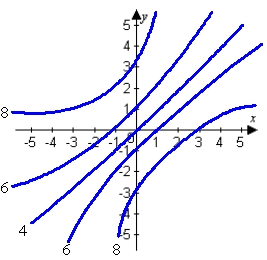
A)
B)
C)
D)
 and
and  at the origin.
at the origin. 
A)

B)

C)

D)


فتح الحزمة
افتح القفل للوصول البطاقات البالغ عددها 112 في هذه المجموعة.
فتح الحزمة
k this deck
45
Find the indicated partial derivative. 
A)
B)
C)
D) 0

A)

B)

C)

D) 0

فتح الحزمة
افتح القفل للوصول البطاقات البالغ عددها 112 في هذه المجموعة.
فتح الحزمة
k this deck
46
Find the indicated partial derivative. 
A) 0
B) 6w2z
C) 12wz
D) 3w2

A) 0
B) 6w2z
C) 12wz
D) 3w2

فتح الحزمة
افتح القفل للوصول البطاقات البالغ عددها 112 في هذه المجموعة.
فتح الحزمة
k this deck
47
Find all first-order partial derivatives. 
A)
B)
C)
D)

A)

B)

C)

D)


فتح الحزمة
افتح القفل للوصول البطاقات البالغ عددها 112 في هذه المجموعة.
فتح الحزمة
k this deck
48
Use the contour plot to estimate  and
and  at the origin.
at the origin. 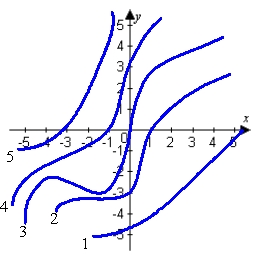
A)
B)
C)
D)
 and
and  at the origin.
at the origin. 
A)

B)

C)

D)


فتح الحزمة
افتح القفل للوصول البطاقات البالغ عددها 112 في هذه المجموعة.
فتح الحزمة
k this deck
49
Show that the function  satisfies the diffusion equation
satisfies the diffusion equation  .
.
 satisfies the diffusion equation
satisfies the diffusion equation  .
.
فتح الحزمة
افتح القفل للوصول البطاقات البالغ عددها 112 في هذه المجموعة.
فتح الحزمة
k this deck
50
Solid bodies, such as mechanical flywheels, experience stress when rotating. The stress s on a flywheel with uniform density d (kg/m3) and radius r (meters) is approximated by ![<strong>Solid bodies, such as mechanical flywheels, experience stress when rotating. The stress s on a flywheel with uniform density d (kg/m<sup>3</sup>) and radius r (meters) is approximated by where is the rotational speed of the flywheel in radians per second. Estimate the percent increase in the stress if the rotational speed of a uniform flywheel is increased from 3205 to 3355 rad/s. [Note: you should be able to answer the question with the given information: no additional information is necessary.]</strong> A) 9% B) 3% C) 0.02% D) 5%](https://d2lvgg3v3hfg70.cloudfront.net/TB5869/11eaa88b_932f_dfaf_a696_2329178029ed_TB5869_11.jpg) where
where ![<strong>Solid bodies, such as mechanical flywheels, experience stress when rotating. The stress s on a flywheel with uniform density d (kg/m<sup>3</sup>) and radius r (meters) is approximated by where is the rotational speed of the flywheel in radians per second. Estimate the percent increase in the stress if the rotational speed of a uniform flywheel is increased from 3205 to 3355 rad/s. [Note: you should be able to answer the question with the given information: no additional information is necessary.]</strong> A) 9% B) 3% C) 0.02% D) 5%](https://d2lvgg3v3hfg70.cloudfront.net/TB5869/11eaa88b_9330_06c0_a696_cb7e81c70f9b_TB5869_11.jpg) is the rotational speed of the flywheel in radians per second. Estimate the percent increase in the stress if the rotational speed of a uniform flywheel is increased from 3205 to 3355 rad/s. [Note: you should be able to answer the question with the given information: no additional information is necessary.]
is the rotational speed of the flywheel in radians per second. Estimate the percent increase in the stress if the rotational speed of a uniform flywheel is increased from 3205 to 3355 rad/s. [Note: you should be able to answer the question with the given information: no additional information is necessary.]
A) 9%
B) 3%
C) 0.02%
D) 5%
![<strong>Solid bodies, such as mechanical flywheels, experience stress when rotating. The stress s on a flywheel with uniform density d (kg/m<sup>3</sup>) and radius r (meters) is approximated by where is the rotational speed of the flywheel in radians per second. Estimate the percent increase in the stress if the rotational speed of a uniform flywheel is increased from 3205 to 3355 rad/s. [Note: you should be able to answer the question with the given information: no additional information is necessary.]</strong> A) 9% B) 3% C) 0.02% D) 5%](https://d2lvgg3v3hfg70.cloudfront.net/TB5869/11eaa88b_932f_dfaf_a696_2329178029ed_TB5869_11.jpg) where
where ![<strong>Solid bodies, such as mechanical flywheels, experience stress when rotating. The stress s on a flywheel with uniform density d (kg/m<sup>3</sup>) and radius r (meters) is approximated by where is the rotational speed of the flywheel in radians per second. Estimate the percent increase in the stress if the rotational speed of a uniform flywheel is increased from 3205 to 3355 rad/s. [Note: you should be able to answer the question with the given information: no additional information is necessary.]</strong> A) 9% B) 3% C) 0.02% D) 5%](https://d2lvgg3v3hfg70.cloudfront.net/TB5869/11eaa88b_9330_06c0_a696_cb7e81c70f9b_TB5869_11.jpg) is the rotational speed of the flywheel in radians per second. Estimate the percent increase in the stress if the rotational speed of a uniform flywheel is increased from 3205 to 3355 rad/s. [Note: you should be able to answer the question with the given information: no additional information is necessary.]
is the rotational speed of the flywheel in radians per second. Estimate the percent increase in the stress if the rotational speed of a uniform flywheel is increased from 3205 to 3355 rad/s. [Note: you should be able to answer the question with the given information: no additional information is necessary.]A) 9%
B) 3%
C) 0.02%
D) 5%

فتح الحزمة
افتح القفل للوصول البطاقات البالغ عددها 112 في هذه المجموعة.
فتح الحزمة
k this deck
51
Find the indicated partial derivatives. 


فتح الحزمة
افتح القفل للوصول البطاقات البالغ عددها 112 في هذه المجموعة.
فتح الحزمة
k this deck
52
Find an equation for the tangent plane at the given point. 
A)
B)
C)
D)

A)

B)

C)

D)


فتح الحزمة
افتح القفل للوصول البطاقات البالغ عددها 112 في هذه المجموعة.
فتح الحزمة
k this deck
53
Use the contour plot to estimate  and
and  at the origin.
at the origin. 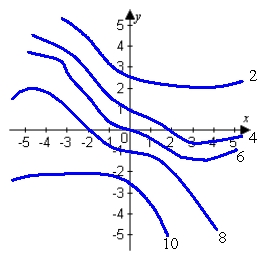
A)
B)
C)
D)
 and
and  at the origin.
at the origin. 
A)

B)

C)

D)


فتح الحزمة
افتح القفل للوصول البطاقات البالغ عددها 112 في هذه المجموعة.
فتح الحزمة
k this deck
54
Find all first-order partial derivatives. 
A)
B)
C)
D)

A)

B)

C)

D)


فتح الحزمة
افتح القفل للوصول البطاقات البالغ عددها 112 في هذه المجموعة.
فتح الحزمة
k this deck
55
Find an equation for the tangent plane at the given point. 
A)
B)
C)
D)

A)

B)

C)

D)


فتح الحزمة
افتح القفل للوصول البطاقات البالغ عددها 112 في هذه المجموعة.
فتح الحزمة
k this deck
56
Find all points at which  .
. 
A)
B)
C)
D) (0, 0)
 .
. 
A)

B)

C)

D) (0, 0)

فتح الحزمة
افتح القفل للوصول البطاقات البالغ عددها 112 في هذه المجموعة.
فتح الحزمة
k this deck
57
Find all points at which  .
. 
A)
B)
C)
D)
 .
. 
A)

B)

C)

D)


فتح الحزمة
افتح القفل للوصول البطاقات البالغ عددها 112 في هذه المجموعة.
فتح الحزمة
k this deck
58
Find all first-order partial derivatives. 
A)
B)
C)
D)

A)

B)

C)

D)


فتح الحزمة
افتح القفل للوصول البطاقات البالغ عددها 112 في هذه المجموعة.
فتح الحزمة
k this deck
59
Find an equation for the tangent plane at the given point. 
A)
B)
C)
D)

A)

B)

C)

D)


فتح الحزمة
افتح القفل للوصول البطاقات البالغ عددها 112 في هذه المجموعة.
فتح الحزمة
k this deck
60
Find all first-order partial derivatives. 


فتح الحزمة
افتح القفل للوصول البطاقات البالغ عددها 112 في هذه المجموعة.
فتح الحزمة
k this deck
61
Find the total differential of  .
. 
A)
B)
C)
D)
 .
. 
A)

B)

C)

D)


فتح الحزمة
افتح القفل للوصول البطاقات البالغ عددها 112 في هذه المجموعة.
فتح الحزمة
k this deck
62
State the chain rule for finding  for the general composite function involving
for the general composite function involving 

A)
B)
C)
D)
 for the general composite function involving
for the general composite function involving 

A)

B)

C)

D)


فتح الحزمة
افتح القفل للوصول البطاقات البالغ عددها 112 في هذه المجموعة.
فتح الحزمة
k this deck
63
Use implicit differentiation to find  .
. 
A)
B)
C)
D)
 .
. 
A)

B)

C)

D)


فتح الحزمة
افتح القفل للوصول البطاقات البالغ عددها 112 في هذه المجموعة.
فتح الحزمة
k this deck
64
Use the chain rule to find the indicated derivative.  , where
, where 
A)
B)
C)
D)
 , where
, where 
A)

B)

C)

D)


فتح الحزمة
افتح القفل للوصول البطاقات البالغ عددها 112 في هذه المجموعة.
فتح الحزمة
k this deck
65
Suppose the production of a firm is modeled by  where k measures capital (in millions of dollars) and l measures the labor force (in thousands of workers). Suppose that
where k measures capital (in millions of dollars) and l measures the labor force (in thousands of workers). Suppose that  and
and  the labor force is increasing at the rate of 90 and capital is growing at a rate of $200,000 per year. Determine the rate of change of production.
the labor force is increasing at the rate of 90 and capital is growing at a rate of $200,000 per year. Determine the rate of change of production.
A) Production is increasing at a rate of 13.27 units per year.
B) Production is increasing at a rate of 2.13 units per year.
C) Production is increasing at a rate of 10.15 units per year.
D) Production is increasing at a rate of 21.29 units per year.
 where k measures capital (in millions of dollars) and l measures the labor force (in thousands of workers). Suppose that
where k measures capital (in millions of dollars) and l measures the labor force (in thousands of workers). Suppose that  and
and  the labor force is increasing at the rate of 90 and capital is growing at a rate of $200,000 per year. Determine the rate of change of production.
the labor force is increasing at the rate of 90 and capital is growing at a rate of $200,000 per year. Determine the rate of change of production.A) Production is increasing at a rate of 13.27 units per year.
B) Production is increasing at a rate of 2.13 units per year.
C) Production is increasing at a rate of 10.15 units per year.
D) Production is increasing at a rate of 21.29 units per year.

فتح الحزمة
افتح القفل للوصول البطاقات البالغ عددها 112 في هذه المجموعة.
فتح الحزمة
k this deck
66
Use the chain rule to find the indicated derivative.  , where
, where 
A)
B)
C)
D)
 , where
, where 
A)

B)

C)

D)


فتح الحزمة
افتح القفل للوصول البطاقات البالغ عددها 112 في هذه المجموعة.
فتح الحزمة
k this deck
67
Find the total differential of  .
.
A)
B)
C)
D)
 .
.A)

B)

C)

D)


فتح الحزمة
افتح القفل للوصول البطاقات البالغ عددها 112 في هذه المجموعة.
فتح الحزمة
k this deck
68
Use implicit differentiation to find  and
and  Assume that the equation defines z as a differentiable function near each
Assume that the equation defines z as a differentiable function near each 

 and
and  Assume that the equation defines z as a differentiable function near each
Assume that the equation defines z as a differentiable function near each 


فتح الحزمة
افتح القفل للوصول البطاقات البالغ عددها 112 في هذه المجموعة.
فتح الحزمة
k this deck
69
Use the chain rule twice to find  for the general composite function involving
for the general composite function involving 

 for the general composite function involving
for the general composite function involving 


فتح الحزمة
افتح القفل للوصول البطاقات البالغ عددها 112 في هذه المجموعة.
فتح الحزمة
k this deck
70
Compute the linear approximation of the function at the given point. 
A)
B)
C)
D)

A)

B)

C)

D)


فتح الحزمة
افتح القفل للوصول البطاقات البالغ عددها 112 في هذه المجموعة.
فتح الحزمة
k this deck
71
Use implicit differentiation to find  .
. 
A)
B)
C)
D)
 .
. 
A)

B)

C)

D)


فتح الحزمة
افتح القفل للوصول البطاقات البالغ عددها 112 في هذه المجموعة.
فتح الحزمة
k this deck
72
Use the given contour plot to estimate the linear approximation of  at
at  . Assume each contour line represents a 1 unit increase from left to right with the left-most contour line corresponding to a value of 1.
. Assume each contour line represents a 1 unit increase from left to right with the left-most contour line corresponding to a value of 1. 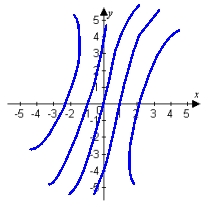
A)
B)
C)
D)
 at
at  . Assume each contour line represents a 1 unit increase from left to right with the left-most contour line corresponding to a value of 1.
. Assume each contour line represents a 1 unit increase from left to right with the left-most contour line corresponding to a value of 1. 
A)

B)

C)

D)


فتح الحزمة
افتح القفل للوصول البطاقات البالغ عددها 112 في هذه المجموعة.
فتح الحزمة
k this deck
73
The number n of gas particles in a leak-tight container is approximately described by the equation  , where T is the temperature of the gas in kelvins (K), P is the pressure of the gas in atmospheres (atm), and V is the volume of the container in liters (L). For a particular sample, an experimenter finds T = 296.6 0.01 K, P = 1.05 0.01 atm, and V = 1.302 0.002 L. Use a linear approximation to estimate the range of the computed value of n.
, where T is the temperature of the gas in kelvins (K), P is the pressure of the gas in atmospheres (atm), and V is the volume of the container in liters (L). For a particular sample, an experimenter finds T = 296.6 0.01 K, P = 1.05 0.01 atm, and V = 1.302 0.002 L. Use a linear approximation to estimate the range of the computed value of n.
A) 0 to
B) to
to 
C) to
to 
D) to
to 
 , where T is the temperature of the gas in kelvins (K), P is the pressure of the gas in atmospheres (atm), and V is the volume of the container in liters (L). For a particular sample, an experimenter finds T = 296.6 0.01 K, P = 1.05 0.01 atm, and V = 1.302 0.002 L. Use a linear approximation to estimate the range of the computed value of n.
, where T is the temperature of the gas in kelvins (K), P is the pressure of the gas in atmospheres (atm), and V is the volume of the container in liters (L). For a particular sample, an experimenter finds T = 296.6 0.01 K, P = 1.05 0.01 atm, and V = 1.302 0.002 L. Use a linear approximation to estimate the range of the computed value of n.A) 0 to

B)
 to
to 
C)
 to
to 
D)
 to
to 

فتح الحزمة
افتح القفل للوصول البطاقات البالغ عددها 112 في هذه المجموعة.
فتح الحزمة
k this deck
74
Find an equation of the tangent plane to the parametric surface at the indicated point. S is defined by  ; at u = -4 and v = -1
; at u = -4 and v = -1
A)
B)
C)
D)
 ; at u = -4 and v = -1
; at u = -4 and v = -1A)

B)

C)

D)


فتح الحزمة
افتح القفل للوصول البطاقات البالغ عددها 112 في هذه المجموعة.
فتح الحزمة
k this deck
75
Use the given contour plot to estimate the linear approximation of  at
at  .
. 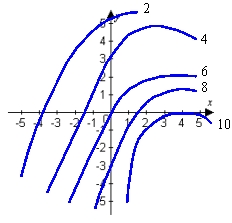
A)
B)
C)
D)
 at
at  .
. 
A)

B)

C)

D)


فتح الحزمة
افتح القفل للوصول البطاقات البالغ عددها 112 في هذه المجموعة.
فتح الحزمة
k this deck
76
Two electrical resistors with resistances R1 and R2 (in ohms) are wired into an electronics circuit as shown in the figure below. The pair of resistors behaves as a single resistor RT whose resistance is given by  . Once the circuit is energized, the temperatures of the resistors increase, causing the resistances to increase according to:
. Once the circuit is energized, the temperatures of the resistors increase, causing the resistances to increase according to:  ,
,  , where t is in seconds. Find
, where t is in seconds. Find  .
. 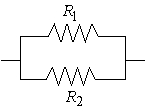
A)
B)
C)
D)
 . Once the circuit is energized, the temperatures of the resistors increase, causing the resistances to increase according to:
. Once the circuit is energized, the temperatures of the resistors increase, causing the resistances to increase according to:  ,
,  , where t is in seconds. Find
, where t is in seconds. Find  .
. 
A)

B)

C)

D)


فتح الحزمة
افتح القفل للوصول البطاقات البالغ عددها 112 في هذه المجموعة.
فتح الحزمة
k this deck
77
Write out the third-order Taylor polynomial for  about (0,0).
about (0,0).
A)
B)
C)
D)
 about (0,0).
about (0,0).A)

B)

C)

D)


فتح الحزمة
افتح القفل للوصول البطاقات البالغ عددها 112 في هذه المجموعة.
فتح الحزمة
k this deck
78
Compute the linear approximation of the function at the given point.  at
at 
A)
B)
C)
D)
 at
at 
A)

B)

C)

D)


فتح الحزمة
افتح القفل للوصول البطاقات البالغ عددها 112 في هذه المجموعة.
فتح الحزمة
k this deck
79
Find the total differential of  .
. 
A)
B)
C)
D)
 .
. 
A)

B)

C)

D)


فتح الحزمة
افتح القفل للوصول البطاقات البالغ عددها 112 في هذه المجموعة.
فتح الحزمة
k this deck
80
Find the gradient of the given function. 
A)
B)
C)
D)

A)

B)

C)

D)


فتح الحزمة
افتح القفل للوصول البطاقات البالغ عددها 112 في هذه المجموعة.
فتح الحزمة
k this deck








